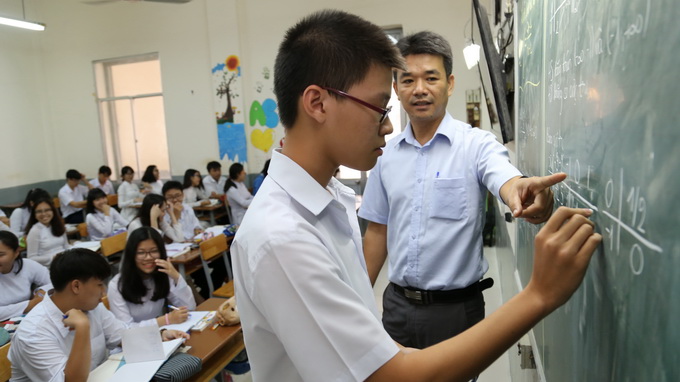A plan to replace the current national high school math paper with a multiple-choice only exam has brought mixed opinions from both local scholars and the public.
Last Thursday, Vietnam’s Ministry of Education and Training (MoET) announced the first draft of its proposed adjustments to the country’s national high school exam, to take effect next year.
The exam was first introduced in 2015 after the previously separate high school graduation and university entrance exams were merged.
The proposed adjustments by the MoET include substantial changes to the exam’s test papers, including the replacement of the traditional written math test with a multiple-choice paper.
The current format features ten problems to which students are required to write their answers, including their step-by-step workings, before arriving at a solution.
The proposed new math paper will comprise of 50 problems, all in multiple-choice format, for which only one of four given answers is correct.
Questions for the test will be drawn at random by a computer from a standardized and updated question list, according to the ministry’s plan.
The proposal was quickly met with mixed reactions, some raising questions over the proposed formats effectiveness in testing students’ mathematical thinking, while others embraced the change as an effective countermeasure to cheating.
The Vietnam Mathematical Society (VMS) was one of the first and most vocal opponents of the plan, calling a press conference on Monday to publicly voice their objection to the proposed math paper.
According to VMS Secretary General-cum-Vice President, Prof. Dr. Phung Ho Hai, most members of the Society’s Executive Committee agreed that the change from a written math paper to multiple-choice question list was a hasty decision that would leave students and teachers unprepared.
The professor added that the effectiveness of multiple-choice math tests employed by the Vietnam National University Hanoi, upon which the new national math paper is based, had not been properly evaluated.
Therefore, Hai said, the new test format should not be applied until its academic credentials are proven.
“The Executive Committee of VMS strongly advises that the MoET retains the current written format for the math paper in the 2017 national high school exam,” Hai said.
The VMS further explained that employing multiple-choice questions in testing mathematical logic and thinking would completely eliminate students’ analytical and problem-solving skills by encouraging tips and tricks to skip to the final answer, rather than demonstrating a full understanding of the logical steps to arrive at a particular solution.

Professor Phung Ho Hai, Sc.D., at the press conference called by the Vietnam Mathematical Society on September 12, 2016. Photo: Tuoi Tre
However, Assoc. Prof. Dr. Nguyen Hoi Nghia, deputy director at Vietnam National University-Ho Chi Minh City, offered a different view, saying that the benefits of multiple-choice tests have not been fully understood in Vietnam even by mathematicians and administrative officials.
According to professor Nghia, objective study is required before reaching any conclusion on whether or not to implement the format in Math papers.
Nghia said he expected the MoET to host national and international seminars on the issue and draw experience from the public and published international math experts.
“In my opinion, the current science of multiple-choice testing does not disqualify it from testing pure mathematical knowledge,” Nghia said.
“Of course a detailed route to its application should be outlined, so that students and teachers can be properly prepared for the transition.”
|
In addition to a change in the math paper, the MoET’s planned changes to the national high school exam include two new test papers; natural sciences and social sciences, each consisting of 60 multiple-choice questions. The natural sciences paper tests students’ aptitude in physics, chemistry, and biology, while the social sciences paper is comprised of questions on history, geography, and ethics. The two new papers will replace the current five separate tests on physics, chemistry, biology, history, and geography, a move the MoET said would reduce costs in organizing the national exam. |
Like us on Facebook or follow us on Twitter to get the latest news about Vietnam!





















































